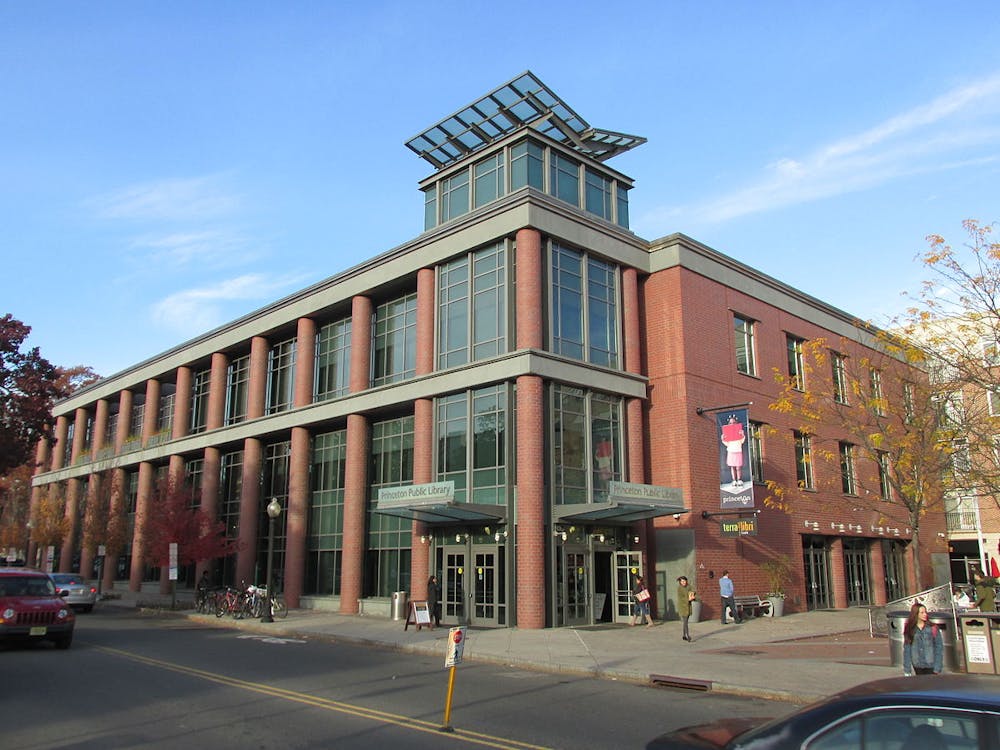More than 70 community leaders, authors, and advocates gathered at the Princeton Public Library (PPL) to stand in solidarity with communities across the nation that have been affected by book bans on Monday, Sept. 23. The event — titled “Stand with the Banned” — was held during Banned Books Week in partnership with the Princeton University Press and Labyrinth Books and featured 22 readers who presented excerpts from both classic literature and contemporary works that were facing censorship in other communities.
State Sen. Andrew Zwicker, who read from “The Perks of Being a Wallflower,” and Councilmember Leighton Newlin, who presented Martin Luther King Jr.’s “Letter From Birmingham Jail,” were among the featured readers. Former Dean of the College Jill Dolan, who retired from her position in June, and Vice President for Campus Life Rochelle Calhoun also participated, reading excerpts from books such as Anne Frank’s “Diary of a Young Girl.”
“We want to stand with everybody else in New Jersey and libraries and librarians across the United States who are facing these increasing challenges,” Janie Hermann, the adult programming manager at PPL, told the Daily Princetonian. “We really want to say that we stand with our colleagues. We support you. We see you. We understand you.”
A “Stand with the Banned” photo booth and community art project accompanied the reading.
Among the book excerpts read aloud were Ronald Dahl’s “James and the Giant Peach,” Ibram X. Kendi’s “Stamped: Racism, Antiracism, and You,” and the picture book “And Tango Makes Three.”
Attendees appreciated the diverse selection of readings and the wide range of presenters, which featured banned authors, professors, artists, and advocates.
“We had a wide variety [of people] from very diverse populations who were speaking about a wide variety and diverse selection of books, which I think is representative of the things that do get banned or challenged,” Liz Begonis, who works at the Bayard Rustin Center for Social Justice, told the ‘Prince’ at the event.
“I particularly enjoyed hearing the children’s books,” Christie Henry, director of Princeton University Press, told the ‘Prince.’ Henry noted that through the read-outs, she realized that “cutting off access to inclusive stories” to young children is “a civic irresponsibility.”
Hermann highlighted that the library aimed to include a wide range of ages and groups to emphasize the strength of book freedom in Princeton.
“We tried to go for diversity in all ways: across the different groups in town, nonprofit organizations, campus partners, different voices on the panel,” Hermann said. “What we were going for was a cross-section of Princeton and showing that this is a town that supports the freedom to read.”
Other attendees expressed surprise at the types of books that have been banned.
“I was compelled — being read to was very powerful, especially hearing books that I have read before or seen before or was familiar with before, but not realizing that they would have any reason to be on a banned book list,” Holly Hardaway said. “It's disturbing, as well as compelling me to want to do something about it further.”

The “Stand with the Banned” event took place amid a growing national debate over book censorship.
According to the American Library Association, 4,240 unique book titles were challenged across the country last year — a 92 percent rise from 2022. In response to this surge in censorship efforts, the Princeton Council unanimously passed a resolution in April declaring the municipality a “Book Sanctuary.”
“The municipality of Princeton is only one of four in the state to join this movement so far,” PPL Director Jennifer Podolsky told the audience. “With the designation of a book sanctuary comes a responsibility to shine the light on book banning by hosting events such as this one.”
Linda Oppenheim, an attendee at the event, told the ‘Prince’ that the movement to ban books continues to resonate throughout the country, “limiting what people can learn, what people can grieve, and what people can exchange with each other to grow in their ideas.”
“How lucky we are that there are still institutions and people who understand the importance of spreading the word, of allowing people to learn,” Oppenheim said. “That’s really the foundation of our democracy.”
Sena Chang is a News contributor for the ‘Prince.’
Please send any corrections to corrections[at]dailyprincetonian.com.








